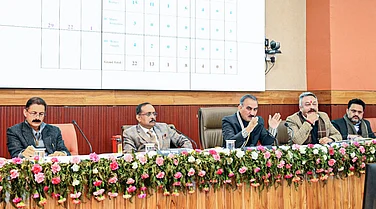1. Azaan and Noise Pollution
Azaan, or Adhan, the religious call given by mosques to remind devotees of prayer time, has been a subject of debate and even sparked communal tensions in parts of India. It has been criminalised for being too loud because it is often made using loudspeakers. Several petitions have been filed for the removal of loudspeakers from mosques, calling it an ‘illegal’ practice.

2. Hijab Controversy
Hijab, the headscarf worn by Muslim women, became a heated point of discussion and led to communal tensions in Karnataka in 2022. Hijab in Islam was introduced as a symbol of modesty. In India, hijab has increasingly gained significance as a way to create a Hindu-Muslim divide. When Muslim women in Karnataka protested against the state government’s hijab ban last year, groups of Hindu students staged a counter-protest wearing saffron scarves. Muslim girls have been denied entry to schools and colleges in many parts of the country for wearing the veil.

3. Gau Raksha or Cow Vigilantism
Cow slaughter is banned in most parts of India. The cow being a sacred symbol in Hinduism, the majority religion in the country, the non-Hindu (and non-believer) population is disallowed from consuming beef. The sale and transportation of cows are met with harsh punishment. Traditionally, beef is consumed by Muslims and Christians. So, banning the consumption of beef in a secular nation is a case of discrimination. There is a growing army of gau rakshaks or cow vigilantes, supported by far-Right Hindu groups, especially in the northern states. They target meat sellers and cattle traders, mostly Muslim, beat them up, or worse, lynch them. The laws against cattle slaughter are made on the pretence of protecting cows, bullocks and buffaloes for economic reasons, without any reference to religion.
4. Jihad is Not War
The term ‘jihad’ in Islam means the spiritual striving against moral failings undertaken by Muslims. However, the word has been given a negative connotation to stoke Islamophobia. Terms like ‘land jihad’, ‘job jihad’, ‘vyapar jihad’, ‘fertiliser jihad’ have been used by political leaders, especially of the ruling party, in public speeches. ‘Land jihad’ even found a place as a promised law in the poll manifesto of the BJP-led Assam government. During the pandemic, some people flung the term ‘corona jihad’ at Muslims.
5. The Conspiracy Theory of Love Jihad
Controversies over interfaith marriages have existed in India since the 1920s. Initially, allegations of forced marriages were termed ‘abductions’, but towards the end of the first decade of the 21st century, a new term was born –‘love jihad’. In 2009, ‘love jihad’ gained national awareness due to a controversy surrounding the alleged ‘forced conversion’ of about 4,500 girls in Kerala. ‘Love jihad’ is a toxic conspiracy theory used by far-Right organisations to propagate hatred against Muslims.

6. Terrorist/ISIS/Jihadi
The targeting of Muslims in connection with terrorism, and terming them ‘jihadi’ is a worldwide trend. With the rise of extremist Islamic groups such as Al-Qaeda and ISIS, and the skewed portrayal of Muslims in popular western media, Muslims are increasingly boycotted. What people fail to see is that terrorism is a political phenomenon and has no connection with Islam, the religion.
7. Anti-national, Pakistani and Bangladeshi Narratives
In the aftermath of the Partition, anti-Muslim rhetoric was whipped up in India and it still continues. At the slightest disagreement, Muslims are termed ‘anti-national’ and asked to ‘Go Back to Pakistan’. Muslims in Bengal and Assam, on the other hand, are stereotyped as Bangladeshi refugees. Attempts have been made by the ruling party to bring in laws that deny Muslim citizens their rightful place. The contentious Citizenship Amendment Act (CAA) is a case in point.

8. ‘Mullah’ and ‘Miya’ as Derogatory Terms
‘Mullah’, ‘Miya’, and ‘peacefools’ are some of the words used in the Indian subcontinent to refer to Muslims in a derogatory manner. ‘Mullah’, a title given to Islamic religious scholars, is used to call out Muslims for allegedly propagating violence. ‘Miya’, originating from ‘mian’, is used as a racial slur to refer to Bengali Muslims, particularly those from Bangladesh. Last year, a BJP MLA from Uttar Pradesh said Hindus who did not vote for him “have miya blood in their veins”. ‘Peacefuls’ or ‘peacefools’ are used to mock Islam’s claim of being a ‘religion of peace’.
9. The Population Myth
For decades, the myth of Muslims overtaking the Hindu population has been propagated. This ill-informed theory was created to stir up hate against Muslims. It has been promoted by Hindu far-Right groups such as the Rashtriya Swayamsevak Sangh (RSS), which claims the Muslim population has grown in India since the Partition and that it poses a threat to Bharat. Another myth that stokes Islamophobia is that Muslims are against birth control. This has no religious basis and is a matter of a lack of awareness about birth control among certain sections of the population.

10. Films with a Propagandist Agenda
Films like The Tashkent Files, Kashmir Files, The Kerala Story and the Narendra Modi biopic starring Vivek Oberoi showcase a distorted view of actual incidents while describing them as ‘based on real-life stories’. They stir up needless controversy and show Muslims in a bad light. These films have received the firm backing of many BJP leaders and Hindu-Right organisations, and have also been declared tax-free in several states.
11. Halal
Halal, the traditional method of meat slaughter in Islam, has been the centre of controversy. Right-wing Hindutva groups claim halal-certified goods contain meat extracts and are unlawful for Hindus to consume. Halal is the method of making a clean slit on the throat and allowing the animal to bleed out before further processing. It is the dietary standard prescribed in the Quran. However, Halal meat traders are boycotted in many parts of India due to the misconception that the method is cruel and unhygienic.
(This appeared in the print as 'Fog Of Wordplay')
Compiled by Sharmita Kar


























